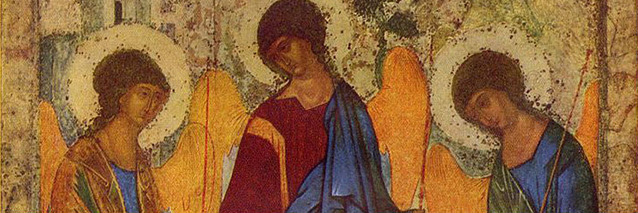
"Lord Jesus Christ, Son of God, have mercy on me, a sinner."
Richard Rohr's Daily Meditation

"Trinity" (detail), c. 1410, Andrei Rublev. Tretyakov Gallery, Moscow.
"Fathers of the Eastern Church"Summary Sunday, May 10, 2015 - Saturday, 16 May 2015
The Cappadocian Fathers developed an intellectual rationale for Christianity's central goal: humanity's healing and loving union with God. (Sunday)
Matter and Spirit must be found to be inseparable in Christ before we have the courage and insight to acknowledge and honor the same in ourselves and in the entire universe. (Monday)
The Mystery of God as Trinity invites us into full participation with God, a flow, a relationship, a waterwheel of always outpouring love. (Tuesday)
Full salvation is finally universal belonging and universal connecting. Our word for that is "heaven." (Wednesday)
If you understand God as Trinity, there is no theological possibility of any hatred or vengeance in God. (Thursday*)
Jesus' foundational and even dualistic bias is against false power and in favor of the powerless. (Friday)
"Practice Hesychasm, Sweet Repose"
Hesychasm, a contemplative prayer of rest, has its roots in the desert fathers and mothers as well as the Eastern Orthodox tradition. Bishop Kallistos Ware, drawing from John Climacus (AD 525-606) writes: "The hesychast, in the true sense of the word, is not someone who has journeyed outwardly into the desert, but someone who has embarked upon the journey inwards into his own heart; not someone who cuts himself off physically from others, shutting the door of his cell, but someone who 'returns into himself,' shutting the door of his mind."[1]
The Eastern Orthodox teachers of hesychasm suggest using the Jesus Prayer as a way to enter into contemplation: "Lord Jesus Christ, Son of God, have mercy on me, a sinner." You might also choose the "replacement therapy" of Centering Prayer, selecting a word or short phrase to return to whenever you are distracted. Repeat each word slowly, softly, and flowing from one to the next. Gradually, with practice, the repetitive rhythm of the words moves into long periods of continuous, uninterrupted prayer.
The hesychast "is called to become conscious of the actual presence of Jesus in the interior of his own being, a presence given full and existential reality by the life of the sacraments."[2]
"The hesychast ceases from his own activity, not in order to be idle, but in order to enter into the activity of God. His silence is not vacant and negative--a blank pause between words, a short rest before resuming speech--but intensely positive: an attitude of alert attention, of vigilance, and above all of listening."[3]
"The principal thing is to stand with the mind in the heart before God, and to go on standing before [God] unceasingly day and night, until the end of life."[4]
Gateway to Silence: We are one.
References:
[1] Bishop Kallistos Ware, The Inner Kingdom, Vol. 1 of the Collected Works (St. Vladimir's Seminary Press: 2004), 93.
[2] John Meyendorff, St. Gregory Palamas and Orthodox Spirituality (St. Vladimir's Seminary Press: 1974), 33.
[3] Ware, The Inner Kingdom, 97.
[4] Igumen Chariton of Valamo, comp., Bishop Kallistos Ware, ed., The Art of Prayer: An Orthodox Anthology (Faber: 1997), 63.
Center for Action and Contemplation
cac.org
Center for Action and Contemplation
1823 Five Points Road SW (physical)
PO Box 12464 (mailing)
Albuquerque, New Mexico 87195 United States
___________________________________
___________________________________





No comments:
Post a Comment